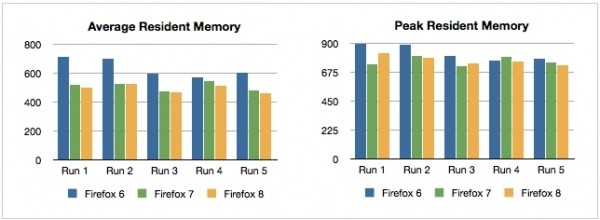Despite being ranked as the second most popular web browser, Mozilla's Firefox has a storied past largely due to unresolved memory leaks. As with its predecessors, Firefox 7 will implement various memory leak issues, according to Mozilla developer Nicholas Nethercote. Nethercote has been posting a weekly progress report on the official Mozilla blog regarding MemShrink, an initiative that began in June to eradicate Firefox's memory inconsistencies.
"Firefox 7 uses less memory than Firefox 6 (and 5 and 4): often 20% to 30% less, and sometimes as much as 50% less," said Nethercote. "In particular, Firefox 7′s memory usage will stay steady if you leave it running overnight, and it will free up more memory when you close many tabs. This means that Firefox 7 is faster (sometimes drastically so) and less likely to crash, particularly if you have many websites open at once and/or keep Firefox running for a long time between restarts".

Mozilla's browser has been criticized for needing large amounts of RAM and then not freeing that memory once windows or tabs have been closed. Nethercote acknowledges these shortcomings, indicating that some versions were more efficient than others. He praised Firefox versions 3, 3.5 and 3.6 but said things deteriorated with version 4 partly because of all its new features, aggressive JavaScript garbage collection and image decoding.
The Mozilla developer feels that Firefox sometimes gets an unfair perception because of buggy browser add-ons.
"I always cringe when someone files a bug report complaining about Firefox's memory usage and they have many (e.g. 10, 20 or more) add-ons installed. The chances of all of those add-ons behaving themselves is pretty low, unfortunately. For example, one user found that the CyberSearch 2.0.8 add-on causes the places SQLite database to grow to over 300MB. Another user found that one or more add-ons caused that same database to grow to 1.2GB(!); the add-on(s) responsible has not yet been identified."
According to NetMarketShare, Internet Explorer remains the most popular web browser with a 52.71 percent market share. Firefox trails at 21.47 percent and Chrome is climbing the proverbial ladder at 13.49 percent.
Firefox 7 is expected to launch on September 27. A beta version will begin testing early next week.